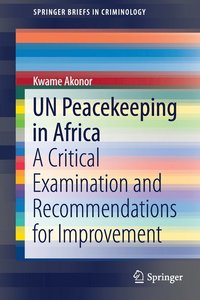
- Format
- Häftad (Paperback / softback)
- Språk
- Engelska
- Antal sidor
- 96
- Utgivningsdatum
- 2016-11-23
- Upplaga
- 1st ed. 2017
- Förlag
- Springer International Publishing AG
- Illustratör/Fotograf
- Bibliographie
- Illustrationer
- 2 Illustrations, color; 2 Illustrations, black and white; XI, 96 p. 4 illus., 2 illus. in color.
- Dimensioner
- 234 x 156 x 6 mm
- Vikt
- Antal komponenter
- 1
- Komponenter
- 1 Paperback / softback
- ISBN
- 9783319391601
- 163 g
UN Peacekeeping in Africa
A Critical Examination and Recommendations for Improvement
- Skickas från oss inom 7-10 vardagar.
- Fri frakt över 249 kr för privatkunder i Sverige.
Passar bra ihop
De som köpt den här boken har ofta också köpt Who's Afraid of Gender? av Judith Butler (inbunden).
Köp båda 2 för 1026 krKundrecensioner
Fler böcker av Kwame Akonor
-
African Economic Institutions
Kwame Akonor
This book analyzes how, and under what conditions, African International Economic Organizations (IEO) have evolved, and what individual and collective contributions, if any, these African IEOs have had on Africas socio-economic development. Provid...
-
Africa and IMF Conditionality
Kwame Akonor
Ghana was one of the first African countries to adopt a comprehensive IMF reform program and the one that has sustained adjustment longest. Yet, questions of Ghana's compliance - to what extent did it comply, how did it manage compliance, wha...
Övrig information
Dr. Kwame Akonor (PhD, City University of New York) is director of the African Development Institute, a New York based think tank that advocates self-reliant and endogenous development policies for Africa. ADI has a consultative status with the United Nations Economic and Social Council. He is also a tenured Professor of International Relations and Human Rights at Seton Hall University (NJ), and Director of the University's Africana Studies Center. Dr. Akonor is author of several articles and two books: African Economic Institutions and Africa and IMF Conditionality, both published by Routledge Press. Dr. Akonor is from Ghana.
Innehållsförteckning
Chapter 1: Introduction and Justification for Research.- Chapter 2: UN Peace Operations in Africa: Yesterday, Today and Tomorrow.- Chapter 3: The Dark Side of UN Peacekeeping: Abuses and Violations in Africa.- Chapter 4: Responses to Peacekeeping Misconduct.- Chapter 5: Analysis and Implications to Broader Issues.
Du kanske gillar
-
48 Laws of Power
R Greene
Häftad


